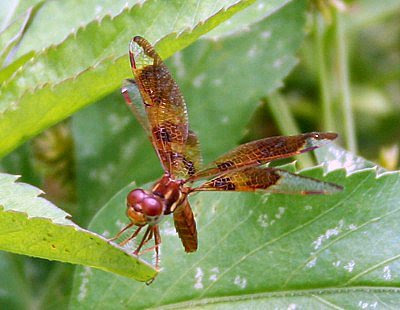Although I was never as counterculture as Libby, I keep finding out that the early-30s Sparky shared many of Libby's current interests. For example, Libby still collects comic books, as I did at her age, a hobby I have since abandoned. She enjoys alternative bands, as I did until my bands matured and started worrying as much about making lots of money as they did about good music. So I wasn't surprised to find this email in my inbox:
From: libby.daniels@_____cc.edu
To: sparky.lightbulb@_____cc.edu
Sent: Tuesday, September 27, 2005 5:34 PM
Subject: Highsmith rocks my world!
Hi, Sparky!
I stopped by Elizabeth's office this afternoon, and she revealed that you're a Highsmith addict! What luck! I've finished 7 of her books so far, and I'm waiting on Amazon to deliver #8 and #9. We have to get together to discuss our favorites!
Your fellow Highsmith junkie,
Libby
 The problem is that I'm not a Patricia Highsmith fan; I'm a lesbian fiction fan. Many years ago, before the Internet and Amazon.com, I belonged to the Quality Paperback Book Club and subscribed to a collection called The Triangle Classics—pink triangle, mind you. There were eight works in the original offering, and QPB kept adding one or two more every six months or so. I felt duty bound to understand my "tribe" and bought them all. I ordered The Price of Salt, a novel Patricia Highsmith originally published under the pseudonym Clare Morgan, when it became available, but since I wasn't familiar with her works like Strangers on a Train or The Talented Mr. Ripley, the novel sat on a shelf for years before I ever picked it up to read. It is an amazingly good book, suspenseful without murder [Highsmith's typical hook] and revolutionary for the early 1950s, as the two women involved save their relationship from the many challenges that confront them. Instead of getting locked up in an insane asylum, committing suicide, or renouncing lesbianism to date men, they live their lives as a committed couple.
The problem is that I'm not a Patricia Highsmith fan; I'm a lesbian fiction fan. Many years ago, before the Internet and Amazon.com, I belonged to the Quality Paperback Book Club and subscribed to a collection called The Triangle Classics—pink triangle, mind you. There were eight works in the original offering, and QPB kept adding one or two more every six months or so. I felt duty bound to understand my "tribe" and bought them all. I ordered The Price of Salt, a novel Patricia Highsmith originally published under the pseudonym Clare Morgan, when it became available, but since I wasn't familiar with her works like Strangers on a Train or The Talented Mr. Ripley, the novel sat on a shelf for years before I ever picked it up to read. It is an amazingly good book, suspenseful without murder [Highsmith's typical hook] and revolutionary for the early 1950s, as the two women involved save their relationship from the many challenges that confront them. Instead of getting locked up in an insane asylum, committing suicide, or renouncing lesbianism to date men, they live their lives as a committed couple. Somehow during my aimless wanderings at Amazon, I was recommended Highsmith, A Romance of the 1950s, an account of the short relationship Highsmith had with Marijane Meaker. The young Highsmith was a vibrant human being, full of promise and talent—not only for writing but also love and growth. I found myself admiring her self-assuredness and ability to take risks. The biography did an excellent job capturing the exuberant life of two young writers in love. That Meaker biography inspired my purchase of Beautiful Shadow, Andrew Wilson's full look at Highsmith's life, from birth to death. That one I couldn't finish. As Highsmith aged and life disappointed her, she became exactly the type of person anyone would fear to become: bitter, self-deluded, an emotional, chain-smoking wreck. [All of her life, though, she was a dedicated journal keeper and learning that factoid inspired me to begin blogging last November.] I quit reading at page 327 [A stolen tabletop card announcing the introduction of frappuccino "lights" at the Barnes & Noble cafe still marks the spot]. I did eventually try two of her crime novels, Strangers on a Train and The Blunderer, but they were both so creepy, I put them down. Maybe if the characters had been women I would have finished, but men behaving in the worst manner possible to imagine just confirmed for me that I prefer female protagonists.
Somehow during my aimless wanderings at Amazon, I was recommended Highsmith, A Romance of the 1950s, an account of the short relationship Highsmith had with Marijane Meaker. The young Highsmith was a vibrant human being, full of promise and talent—not only for writing but also love and growth. I found myself admiring her self-assuredness and ability to take risks. The biography did an excellent job capturing the exuberant life of two young writers in love. That Meaker biography inspired my purchase of Beautiful Shadow, Andrew Wilson's full look at Highsmith's life, from birth to death. That one I couldn't finish. As Highsmith aged and life disappointed her, she became exactly the type of person anyone would fear to become: bitter, self-deluded, an emotional, chain-smoking wreck. [All of her life, though, she was a dedicated journal keeper and learning that factoid inspired me to begin blogging last November.] I quit reading at page 327 [A stolen tabletop card announcing the introduction of frappuccino "lights" at the Barnes & Noble cafe still marks the spot]. I did eventually try two of her crime novels, Strangers on a Train and The Blunderer, but they were both so creepy, I put them down. Maybe if the characters had been women I would have finished, but men behaving in the worst manner possible to imagine just confirmed for me that I prefer female protagonists. So the decision: How should I respond to Libby's email? I am not out at work and, to be perfectly honest, don't want to be. All of my colleagues would say that I am a very private person, that they know very little about my personal life. I certainly don't want the one area they do discuss to be my sexuality. So I found myself severely editing my response to Libby:
So the decision: How should I respond to Libby's email? I am not out at work and, to be perfectly honest, don't want to be. All of my colleagues would say that I am a very private person, that they know very little about my personal life. I certainly don't want the one area they do discuss to be my sexuality. So I found myself severely editing my response to Libby: From: sparky.lightbulb@_____cc.edu
To: libby.daniels@_____cc.edu
Sent: Wednesday, September 28, 2005 7:58 AM
Subject: Re: Highsmith rocks my world!
Libby—
I hate to disappoint, but Elizabeth misled you.Gay girl that I am,I enjoylesbian fictionauthor biographies and so have readonly The Price of SaltBeautiful Shadow. I started The Blunderer and Strangers on a Train butfound them too creepynever finished them. Tell me which of her works is your favorite, and I'll try reading her one more time. If you are interested insome girl-on-girl actionthe biography, let me know, and I'll putThe Price of Salt and a book chronicling her affair with Marijane Meakerit in your box.
Sparky


















